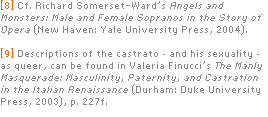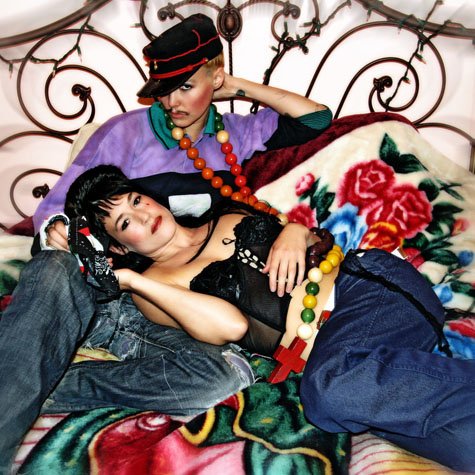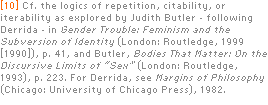| 
Antony’s voice comes across as “different”. It has to do with his use of vibrato, the way he employs pitch, and the very sound of the voice, something notoriously difficult to pin down in words. Not that one would misperceive – if that is the word – it as the voice of a woman. But even stating the point in this way shows show much sexual difference is taken for granted when discussing the voice. Descriptions of his voice have often used words such as “angelic” and “ethereal,” and he has been called “a creature” as if to challenge any notion of a gendered human being. The term “creature” might obviously constitute a problem here. It is as if the humanity of Antony is questioned, and the term quite obviously might have a transphobic ring to it. It also resembles how, historically, the voice of the castrato was described, as angelic or monstrous, and thus in a particular sense non-human.[8] But, as with the voice of the castrato, this also opens up the possibility of describing a queer voice.[9] And Antony’s voice is, in a particular sense, a queer voice, and I understand this term primarily as signifying a non-normative voice. Invoking the term queer, however, at the same time means that one will have to define, somewhat clearer, what queer (could) mean. |  | 
| 
| 
|  |  | 
|  | | 
|  |  | 
|  |  | 
|  |  | A good place to start is listening to Antony’s voice on the song “Beautiful Boyz” from CocoRosie’s album Noah’s Ark (2005). Antony is singing the chorus, “all those beautiful boyz”, whereas Bianca Leilani Casady (“Coco”) is singing the verses, about a “he” that might or might not be “Antony”. Here his voice challenges some of the traditional understandings of gender. We hear a queer voice, but the queerness is still not easily interpreted. The queerness at least partly comes through as a result of the interplay of voice, melody, and lyrics. The text interferes in the discussion, given its more explicit expression, its more concrete content, and as such establishes frames of interpretation. But the queerness also results from the interplay between Coco and Antony, where a staging or performance is taking place, albeit without any clear-cut or determined meaning. The song is left open. |  | | 
|  |  | Born illegitimately
To a whore most likely
He became an orphan
He was sent to the reformatory
Ten years old was his first glory
Got caught stealing from a nun
Now his love story had begun Thirty years he spent wandering
A devil’s child with dove wings
He went to prison
In every country he set foot in
Oh how he loved prison All those beautiful boyz
Pimps and queens and criminal queers
All those beautiful boyz
Tattoos of ships and tattoos of tears His greatest love was executed
The pure romance was undisputed
Angelic hoodlums and holy ones
Angelic hoodlums and holy ones All those beautiful boyz … |  | | 
|  |  | A key reference, however, is obviously the “beautiful boyz”; they being, in one way or another, outcasts: “Pimps and queens and criminal queers”. They are outsiders; they challenge normativity; and they are thus Antony’s co-conspirators as well. The images and language used partake in the construction of gender. These “boyz” – the outsiders – are at the same time tightly interwoven with understandings of masculinity. But when speaking about masculinity it is imperative to employ this term in the plural; masculinities. The inherited image of gender is challenged, and as soon as there are several understandings it becomes difficult to uphold a “normative” or “normal” version of masculinity. The plurality thus opened is inscribed as repetitions of figures, a logic being central because showing that there are no “free choices” when one “chooses” a gendered identity. There are existing scripts one becomes inscribed into. I am not claiming that there is no agency here, just that one can never choose totally as one sees fit. Within this logic we find that the repetitions are never of “the same”; there is a difference inscribed.[10] In the repetitions, then, we find the meeting-point between sameness and difference. |  | 
| 
|  |  | 
An increasingly important part of the popular music culture is what could be termed a voicing of queer subjectivities.[11] Antony is a good example for such a discussion, but to make some of these dimensions clearer, in this passage I will compare one song by Antony with another from Rufus Wainwright. Such a comparison hopefully will throw light on some of the different strategies for voicings of the queer subjectivities; different strategies simultaneously showing the differences for non-normative identity-constructions. Antony and Rufus have collaborated on several occasions; Rufus singing duet with Antony on “What Can I Do?” from Antony and the Johnson’s I Am A Bird Now (2004), and Antony singing duet with Rufus on “Old Whore’s Diet” from Wainwright’s Want Two (2005). These duets show something particular about the respective voices, not least when compared with how these singers’ voices are heard when they sing alone. The duets underline other dimensions in the voices, primarily in the interplay between them, where the question “who’s on top?” might be applied to say something about these differences.[12] Other examples where this play is put forward can be found on I Am A Bird Now, best heard in “You Are My Sister,” when Antony sings together with Boy George, and on “Fistful of Love”, when Lou Reed collaborates. |  | 
| 
| 
|  |  | Rather than discussing these duets, two other songs, from the same albums, might be used to describe different strategies for the voicing of queer subjectivities: Wainwright’s “The Art Teacher” and Antony’s “For Today I Am A Boy”. They are both sung in the first person, but rather than clearly voicing a first-person narrative these versions of “first person” establishes a persona. Here it should be remembered that the very term “person” comes from Latin per sonara, meaning the voice or sound (sonara) coming out through a theatrical mask (originally in Latin plays). In other words, the person/a is intimately related to masquerades, to metaphors taken from the theater, and thus to a play of and with the personal as a voicing of some kind of persona. Subjectivity, in this sense, is a staging, a representation, but at the same time a “making-present” – and this not least through the voice – a role, rather than some kind of essential being behind the mask. |  | | 
|  |  | 
|  |  |
|